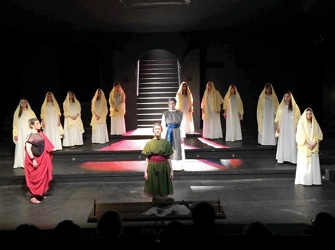
Theater actors are not generally a self-effacing bunch. Dreams of having their names up in lights must be a powerful motivating factor. Indeed, many theaters, even on tour in the provinces, usually need a lead actor known from television or cinema to help sell tickets. In the case of the Théâtre du Nord-Ouest in Paris, however, the opposite is true. With no individual program, only a list of names unassigned to roles provided on the season’s program, this enterprising company lets the actual plays do the talking. From May to September, it is giving full voice to the complete theater of the great 17th-century tragic dramatist Jean Racine.
Whereas it is relatively easy to find productions of Racine’s Phèdre, Andromaque or Britannicus, a number of his other works, such as his one comedy, Les Plaideurs, or his two religious dramas, are staged much less often. Having never seen a production of Racine’s last work, Athalie, I was delighted to finally get the chance.
Written for the schoolgirls of Saint-Cyr, an educational foundation set up by Madame de Maintenon, Louis XIV’s mistress then second wife, Athalie concerns the widow of the King of Judah, who abandons the Jewish religion for the worship of Baal and thinks she has successfully eliminated her entire family, potential rivals for her throne. She is unaware, however, that her young grandson Joas has been saved by the High Priest Joad and his wife Josabet and kept concealed in the Jewish temple in hopes that he will redeem the Jewish nation.
In this version, director Olivier Bruaux has chosen, as in the original production at Saint-Cyr, to have all the roles played by women (even though authenticity only goes so far here: a couple of these actresses have not passed through school gates for half a century at least).
Having abandoned the use of the ancient Greek chorus in his earlier theater, Racine chose to use a chorus in his final two plays, and in Athalie the members of the Chorus help to link the five acts and comment on the imminent danger of Athalie entering the temple. Dressed in white robes and standing bathed in a bright light on a central staircase, their effect is illuminating in more ways than one.
All the actresses are strong, but special mention should be made of Patricia Bourrillon, who played the apostate priest Mathan and really packs a punch in her delivery of the lines. Although little is made in this production of the all-important post-dramatic time (Joas will not turn out to be quite so perfect a king of the Jewish nation as is hoped in the course of the play itself), and the flow of the 12-syllable alexandrine line of verse is at times slowed down by overly long pauses, this is a thoughtful, energetic and moving production of Racine’s final drama.
Favorite